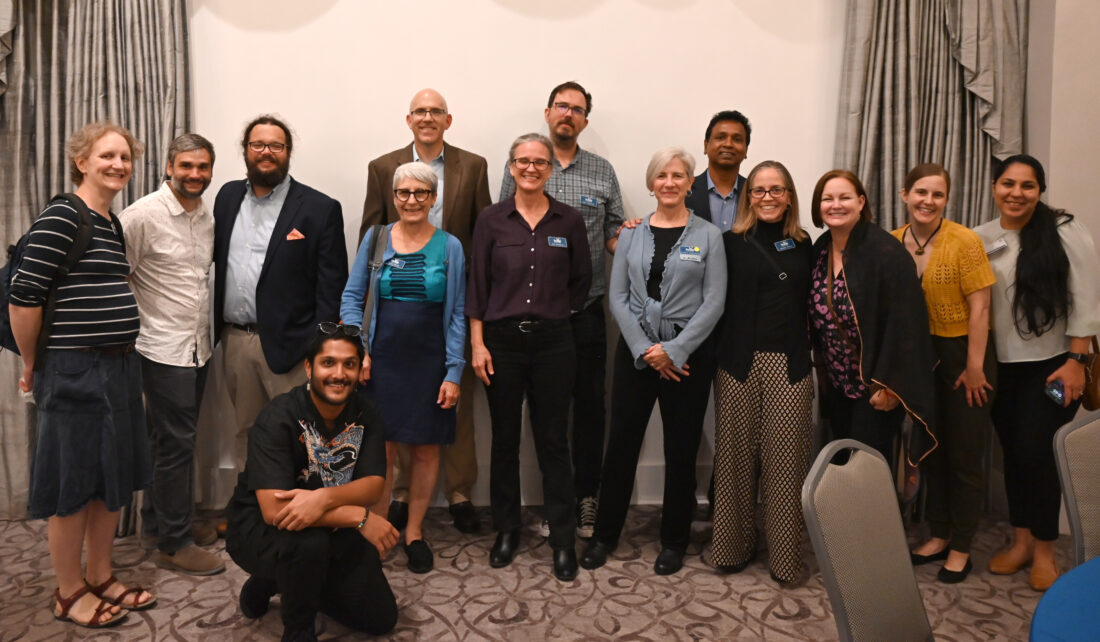
The Great Lakes Sea Grant Network (GLSGN) met in September for the first time in four years. Hosted by Illinois-Indiana Sea Grant (IISG) in Evanston, Illinois, the gathering offered opportunities for Sea Grant staff from throughout the Great Lakes region and the national office to plan, share resources and knowledge, and celebrate people and projects. It was good to see familiar faces and meet new ones.
At the meeting’s Awards Banquet, Amy Shambach, our aquaculture marketing outreach associate, was honored with the 2023 GLSGN Early Career Award. Amy has been with IISG since 2019 and has developed numerous outreach products, including videos, factsheets, and websites. She has organized and led webinars and workshops in the two states and helped lead Great Lakes-wide projects.
Throughout her four years with IISG, Amy has worked closely with fish farmers and has been someone they can turn to for guidance and information. As a result, she was able to help some farmers successfully secure federal support during COVID.
In other honors, earlier in the summer, IISG’s Ashley Belle, as part of the Spirit Lake Project team, shared the 2023 Western Dredging Association Environmental Excellence Award for Partnerships and Outreach/Education. Spirit Lake, located in the St. Louis River Great Lakes Area of Concern, is undergoing an environmental cleanup. Throughout that process, Ashley and the team have provided public meetings, regular updates delivered to residents, online photo galleries, and an onsite kiosk.
In other good news, we have announced our 2024 Knauss Fellowship finalist. Samantha Garcia, a master’s candidate in natural resources at the University of Illinois, will bring her background in researching invasive species, her previous fellowship experience in applied statistics, and her work bringing science and communication to marginalized communities to this fellowship.
The Knauss fellowship is a one-year paid opportunity in Washington D.C. for current and recent graduates from advanced degree programs (MS, PhD, JD) to apply their scientific knowledge and experiences to policy and public administration. Visit our fellowship page to learn more about applying for the 2025 cohort.
We are happy to welcome two new members to our aquatic invasive species (AIS) team. Natalia Szklaruk is our new AIS educator who will equip the public with essential tools, knowledge, and resources to prevent the introduction and spread of these species. Karter Burgdorf, the new AIS outreach associate, will research human knowledge and behaviors driving non-native aquatic species introductions in southern Lake Michigan.
The fall season brings a round of workshops to share new knowledge to extension educators, teachers, and fishers.
Purdue and Illinois Extension educators have the opportunity to take part in Purdue Rainscaping Education Program training. This effort will expand the expertise and reach of this bi-state program that helps communities install rain gardens and other green infrastructure to manage stormwater. These newly trained educators will bring this knowledge to master gardeners, local decision makers, and others in their region.
We have a learning opportunity for teachers and other educators. The Aquaponics Teacher Training Workshop will take place on Saturday, November 4, at the Chicago High School for Agricultural Sciences. In addition to information about aquaponics, this free, all-day workshop will include a tour of the high school’s aquaponics space, information about mini-grants, and a free water quality test kit.
The fall 2023 Lake Michigan Fisheries Workshop will take place in person on the evening of Wednesday, November 1 at the Portage Lakefront Riverwalk Pavilion. A virtual workshop and Q&A session with the speakers is scheduled for the evening of November 9 via Zoom. Topics will include a discussion of tracking fish with acoustic telemetry and emerging research on PFAS in Lake Michigan fishes.
Finally, speaking of tracking fish with telemetry, the Chicago Tribune reported on an IISG collaboration with Shedd Aquarium and Purdue University’s Department of Forestry and Natural Resources to track fish movement in the Chicago River. Researchers placed a total of 28 acoustic receiver devices in downtown waters and implanted acoustic tags in many largemouth bass, bluegill, and common carp.
Collectively, these tags and receivers will help us understand and visualize how fish in this system move in response to factors such as habitat enhancements, sewage overflow events, and seasonally changing conditions.
Tomas Höök
Director, Illinois-Indiana Sea Grant
Illinois-Indiana Sea Grant is a partnership between NOAA, University of Illinois Extension, and Purdue University Forestry and Natural Resources, bringing science together with communities for solutions that work. Sea Grant is a network of 34 science, education and outreach programs located in every coastal and Great Lakes state, Lake Champlain, Puerto Rico and Guam.

